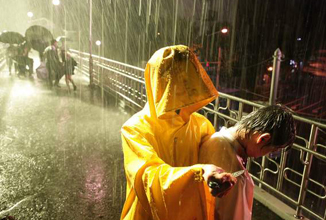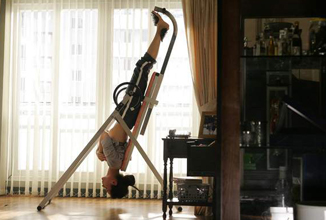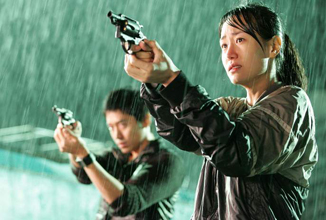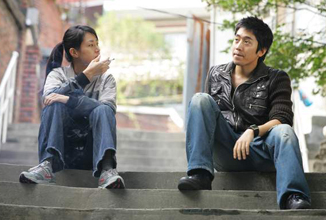"So I can breathe a bit... So I can live a little... Just go somewhere. For a little while, just go away, okay?"
Shortly after being teamed up to work together, veteran Seoul police detective Ja-young (Shin Eun-kyung) and rookie cop Dong-wook (Eric Moon) are assigned to investigate the death of a high school student who is thought to have committed suicide. An autopsy is performed, revealing a small, pill-like capsule inside the boy's body which contains a scrap of paper from a diary, with the details of a previous murder (of another high school student) written on it. When a similar capsule is also found in that victim's body, Ja-young and Dong-wook realise that both boys were, in fact, murdered by a serial killer and, convinced that the writer of the diary is the perpetrator, they set out to track him down.
The only problem is, he too is dead...
Review:
Diary of June starts out strongly with a short, sharp (literally) scene showing the earliest of the murders on a pedestrian overpass followed, in quick succession, by two brief montages depicting the day-to-day lives of Ja-young and Dong-wook. Each of these is expertly handled, with hints - clearly shown but not overtly focused on, forced or overstated - speaking volumes about not only the two detectives, but also the killer.
The most notable of these character "clues" is the murderer's choice of a bright yellow raincoat, which stands out massively against the rain-soaked, drab, night-time surroundings and the bland, muted colours of the clothes of passers by. This killer, clearly, has no desire to hide in a crowd, and this deliberate boldness of attire not only gives an early inference to the killer's desire for his/her culpability to be known, but also speaks of a bold, fearless psyche with (as we later learn) a desperate need for the reasons behind the murders to be understood.
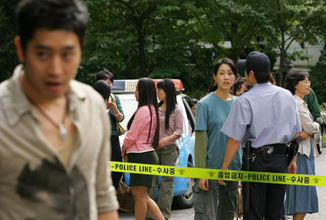 |
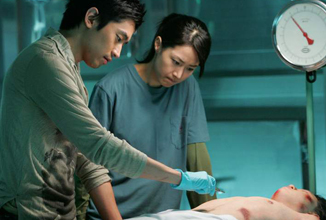 |
And so it is with the plot. Regardless of a couple of red herrings early on in proceedings, Diary of June could never really be described as a whodunit, with viewers' (as well as the characters') ability to ascertain the identity of the killer fairly quickly enabling the true nature of the film to come to the fore, and the underlying themes to be delved into.
At its core, Diary of June is a critique of the school system; of the pressures placed on children by their parents (and vice versa) and their peers; and an in-depth discussion of the causes, and consequences, of bullying to those both directly and indirectly involved.
With such a heavy and involved subject matter, it would be all too easy for the story to become bogged down with excessive moralising, or cloying melodramatics, but, while there are several instances where the themes are somewhat overplayed, director Im Kyung-soo manages to balance these (more often than not) with some well placed and genuinely funny moments from the two incredibly likeable characters of Ja-young and Dong-wook. However, not all of these moments work as well as they, perhaps, should and there is more than one instance where we seem to be watching caricatures rather than fully-fledged characters.
It must also be said that there is a repeated feeling that Ja-young and Dong-wook are almost inadvertently stumbling on discoveries throughout the film, rather than using detective reasoning to solve the case - but here I am guilty of nit-picking, to a degree.
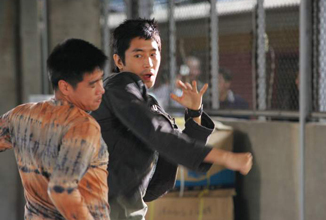 |
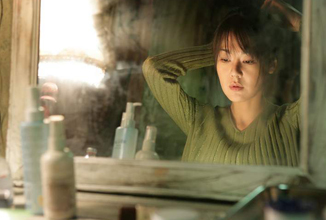 |
Of all the story elements and sub-plots, easily the strongest (both in terms of narrative and emotional resonance) is that of the relationship between Ja-young and her nephew, which deftly links the many plot strands together and perfectly allows a contrasting of the positive result of listening to the needs of others against the negative fallout created by selfishly turning a deaf ear.
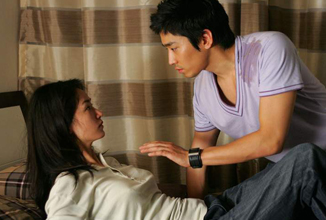 |
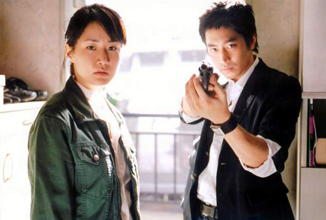 |
Cinematically, Diary of June is accomplished - especially in relation to the night-time murder scenes, which are absolutely sumptuous - and the use of unusual and unpredictable camera angles and framing, combined with a musical score which accentuates the visuals throughout, all add up to a film which is rather arresting (apologies for that phrase, kind of), to the extent that the aforementioned flaws are generally more easily forgiven.
In fact, the weakest aspect in Diary of June, overall, is the erratic pacing, and though it doesn't actually prevent plot movement, it is fairly noticeable. Especially considering the strength of the early scenes, that really is rather a shame.
 |
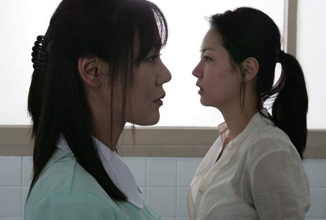 |
Cast:
The main cast all give good performances throughout the film, with really the only criticism of their roles being the instances where some appear as little more than caricatures. Of course, that is not the fault of any of the cast per se, and is much more the result of dialogue and plot flaws.
Of all the character portrayals, however, the most note-worthy are those provided by Kim Yoon-jin and Kim Kkobbi which easily stand head and shoulders above the rest. One scene in particular - showing Seo Yun-hee (the diary writer's mother), played by Kim Yoon-jin - sitting alone and crying, her face totally filling the screen frame) is quite simply a perfect portrayal of love and pain combined, and though fans of South Korean cinema will, no doubt, have seen many instances of similar scenes in various films, but the plethora of emotions which Kim Yoon-jin manages to convey, in such a short space of time, allows her performance to stand shoulder to shoulder with the majority, of even the best, of those.
Summary:
Though certainly not a perfect film (if such a thing exists), Diary of June still has much more to offer than standard serial killer fare, detailing, within its story, a fairly taut critique of the school system, bullying and the pressures placed on children by parents, and vice versa.
Cast (Actor... Character):
Shin Eun-kyung… Chu Ja-young
Eric Moon… Kim Dong-wook
Kim Yoon-jin… Seo Yun-hee
DVD
The DVD edition reviewed here is the Korean (Region 3) 2-Disc Special Edition from Fantom Entertainment, which has as an anamorphic transfer with an aspect ratio of 2.35:1.
The DVD itself comes encased in a heavy duty deluxe case containing a standard amaray package. A detailed booklet (written in Korean) on various aspects of the film is also included.
Image quality is exemplary with an impressively clean print being used for the transfer. There are no image artifacts present and the picture really does justice to the stunning visuals.
The original Korean language soundtrack is provided as a choice of Dolby Digital 5.1 and DTS 5.1, and each is clear and noticeably expansive. Excellent subtitles are provided throughout the main feature, but English speaking viewers should note that there are no subtitles available on any of the extras.
DVD
Details:
• Director: Im Kyung-soo
• Format: NTSC,
Anamorphic, Widescreen, Subtitled
• Language: Korean
•
Subtitles: English, Korean
•
Sound: Dolby Digital 5.1, DTS 5.1
• Region: Region 3
• Aspect Ratio:
2.35:1
• Number of discs: 2
• Classification: 15
• Studio:
Fantom Entertainment
• Run Time: 107 minutes (approx.)
DVD Special Features:
Disc 1:
- Audio Commentary by director Im Kyung-soo
Disc 2:
- Making Film (Featurette)
- Director Interview
- Deleted Scenes
- Promotional Video
|


